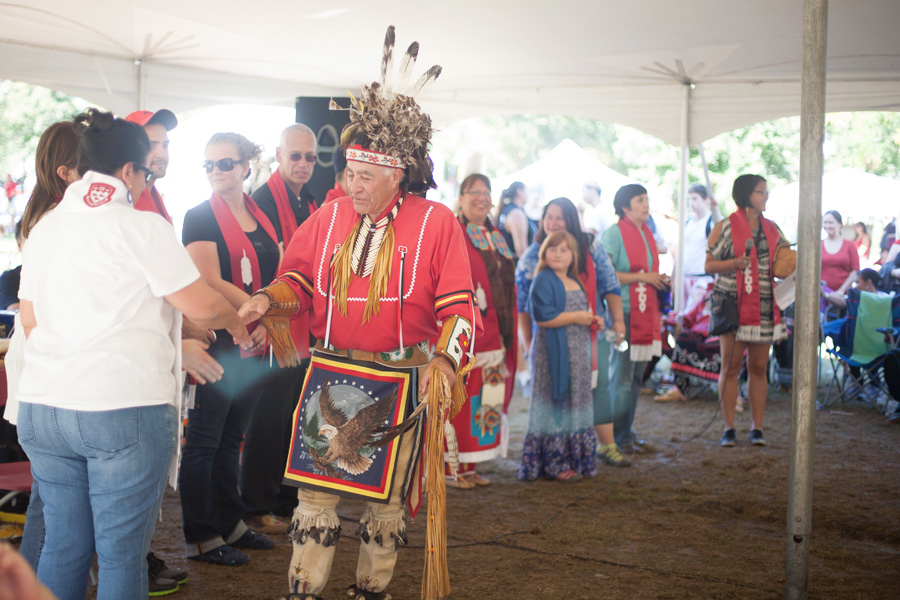Last week, McGill hosted its third annual Indigenous Awareness Week. Organized by the Social Equity and Diversity Education Office’s Indigenous Education Program, the week’s events included workshops on dreamcatcher making, hoop dancing, and the Mohawk language and tradition, as well as discussions on contemporary issues such as the health, welfare, and legal treatment of the Indigenous community within Canada.
Allan Vicaire, an Indigenous Education advisor at McGill and organizer of the week’s events, said some of the important issues addressed throughout the week included the development of McGill’s Indigenous Studies program and raising awareness of the challenges faced by Indigenous women. Other topics of discussion included multi-level governance, health, and the meaning of Indigenous identity.
“The aim is to provide an opportunity to the McGill community […] to learn and really better understand Indigenous people in Canada—that includes First Nations, Métis, and Inuit,” Vicaire said. “We have 16 events this year—we have panel discussions, we have guest speakers, [and] we have community members, elders, and students who are going to be teaching each other about a variety of issues.”
McGill’s Indigenous Studies program, to be introduced in Fall 2014, was discussed in a presentation on Sept. 25. McGill already offers multiple courses on topics concerning Indigenous peoples, but to be officially recognized as a minor the program requires an introductory and capstone course—a course that allows students to synthesize subject matter and integrate their cross-disciplinary knowledge. The discussion last week was organized by SSMU Vice-President University Affairs Joey Shea, SSMU Religious Studies Senator Haley Dinel, and Professor of Communication Studies William Straw, they said they aimed to provide feedback regarding questions raised in the preliminary research stage of the program.
“It’s a bureaucratic process, [but] the proposal is in the system,” Straw said. “We already have four courses now—that’s 12 credits. That’s one third of our program in Aboriginal issues [….] In 2014 I will introduce the 200-level introductory course. Even if, for some form of reason, the minor is not approved, that course will be there, ready to become Indigenous studies.”
Department heads must grant approval before the program officially becomes a minor. The minor will consist of an introductory and capstone course plus other courses cross-listed across the Faculty of Arts.
Another event was a lecture by Mary Eberts last Wednesday on the negotiation tactics used by Canadian courts towards the claims of Indigenous people. Eberts, a member of the legal counsel for the Native Women’s Association for Canada and expert in Indigenous Law, spoke about how the Canadian courts and government do not always recognize previous settlement treaties with the Indigenous community.
“They took status away from women; that’s the colonizers’ designation,” Eberts said. “It meant [children] could no longer live with their families, and there was a lot of really brutal stuff that was going on against Indigenous women as part of the colonising enterprise […. It’s] still all there in The Indian Act and I think we have to root it out.”
Eberts praised McGill’s Indigenous Awareness Week for the insight it could provide into some of the issues faced by the Indigenous community.
“I think it’s a wonderful idea,” Eberts said. “The best way of affecting change is for us to know one another and talk to one another, to have shared experiences, and then leave the doctrine aside and just get to know one another and get to know the issues from someone else’s perspective.”
Members of the community appeared sincerely interested, staying engaged at some events well after they were over.
“Yesterday we had our ‘Mohawk 101’ from Akwiratékha Martin, […] and it was full,” Vicaire said. “It was meant to last till 8:00, but it lasted till 8:30 because people were still there asking questions […] It was such a wonderful event.”
The week’s events attracted a number of McGill faculty, staff, and students who responded positively to the events.
Frasier Harland, a first-year law student, said he attended Ebert’s lecture because his undergraduate degree was in political science, with a focus on Indigenous relations in Canada.
“I was really interested to see how it would be treated in a more legal context,” Harland said. “Overall, I thought it was really impassioned and [an] important speech and lecture.”
Indigenous Awareness Week ended on Friday with a community social and feast at the Native Friendship Centre of Montreal.







